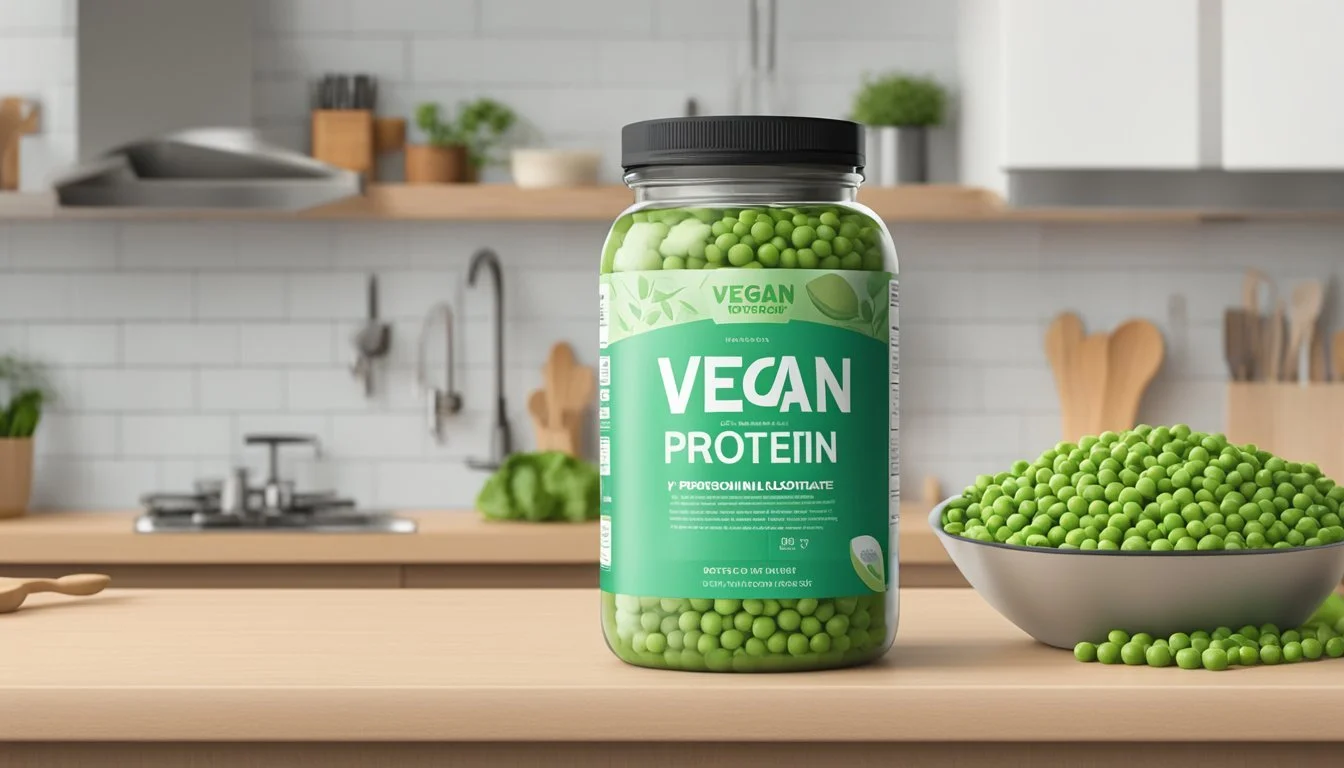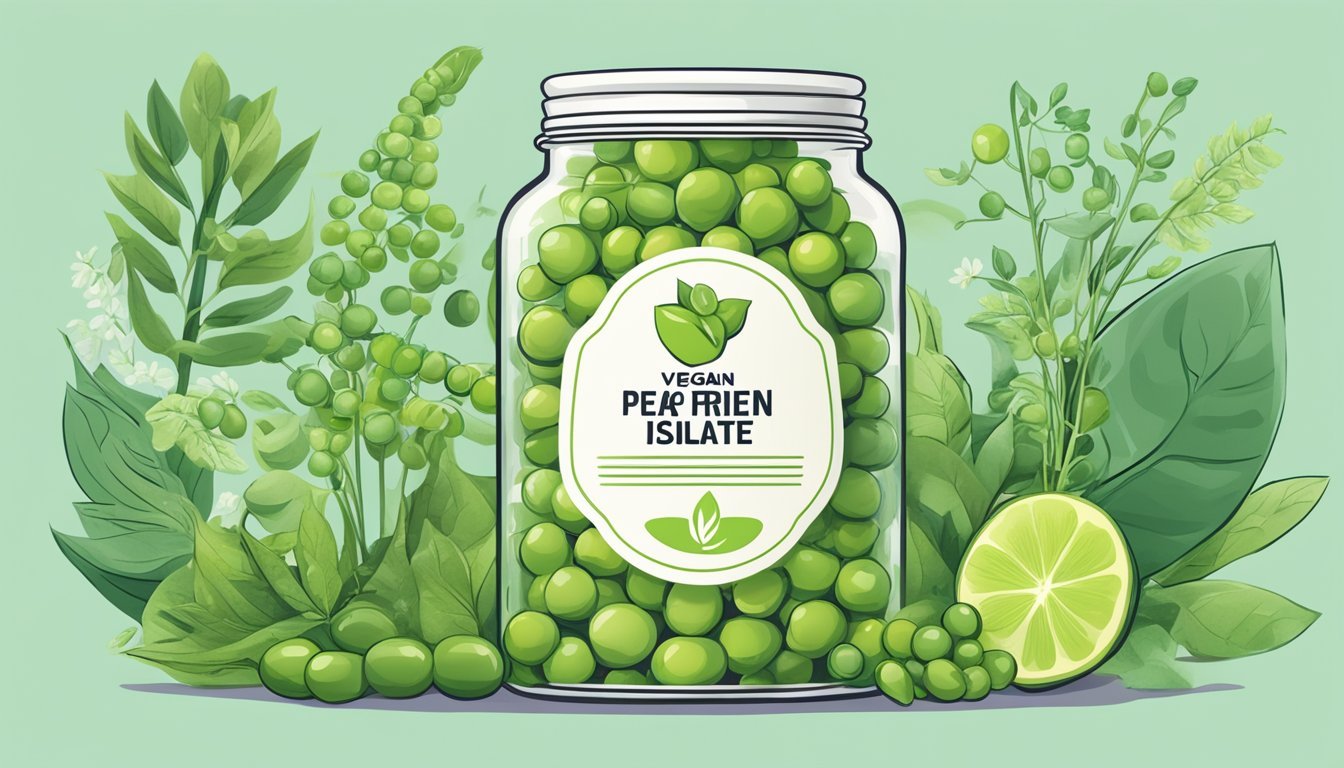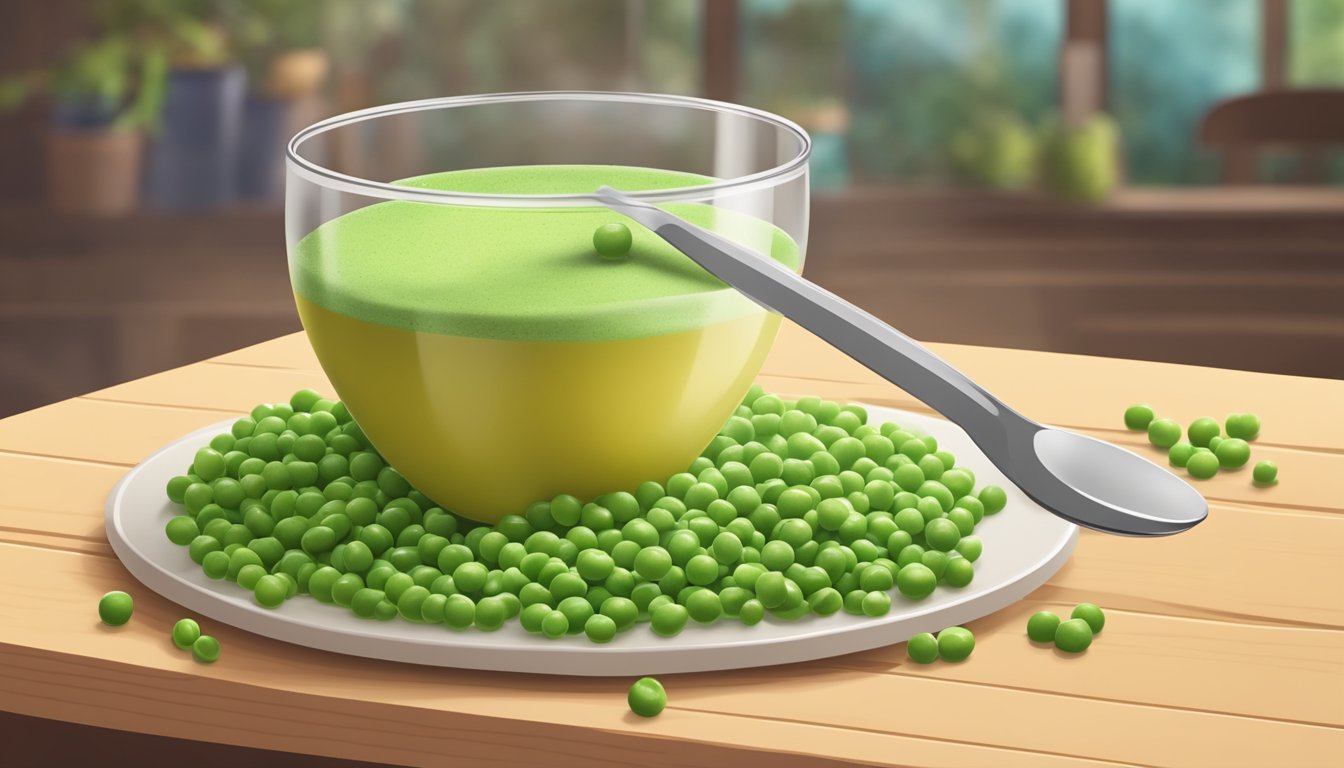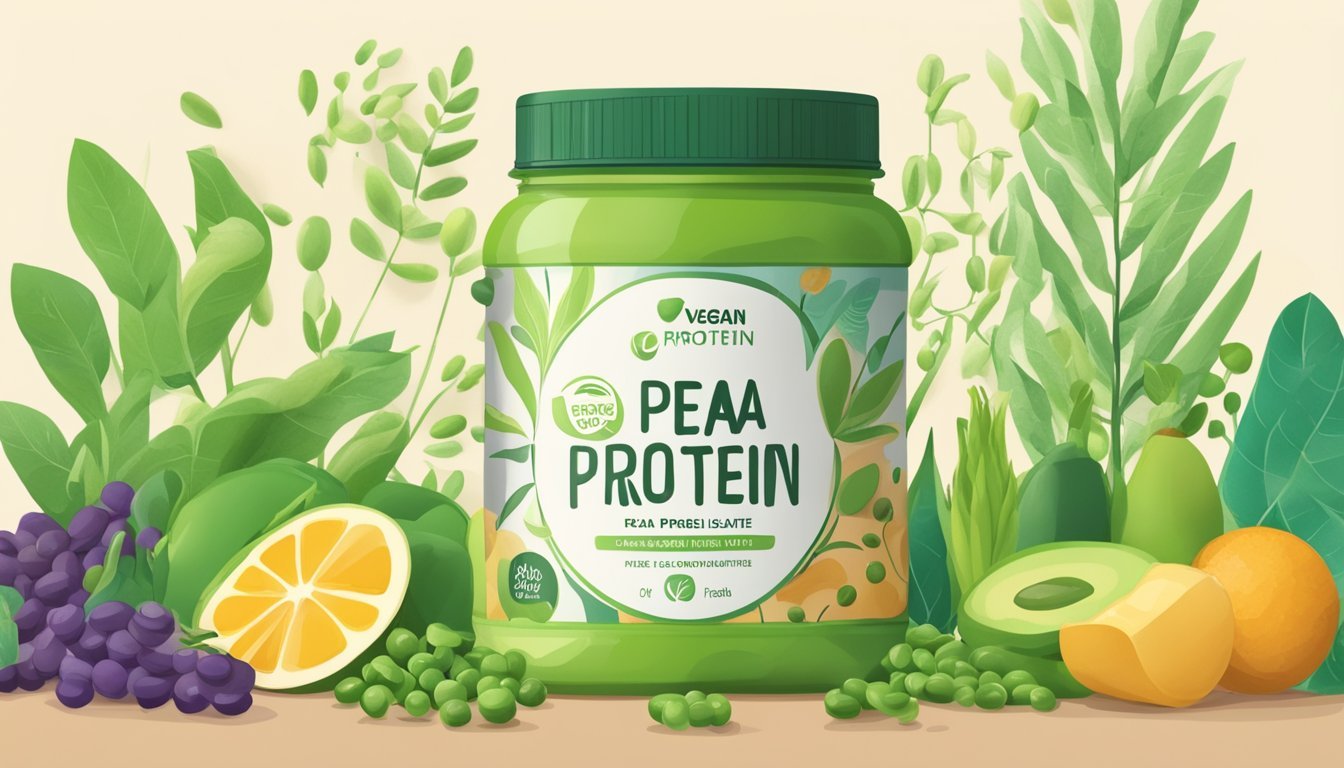Is Pea Protein Isolate Vegan?
Unveiling the Plant-Based Truth
Pea protein isolate is a high-quality plant-based protein powder that stands out for its suitability for vegans and those with certain dietary restrictions. It is derived from yellow peas and is a natural vegetable-based protein, making it an entirely vegan option. Pea protein isolate offers a significant amount of protein, typically containing between 15 to 20 grams per scoop, offering a comparable amino acid profile to dairy-based proteins like whey.
The production process of pea protein isolate involves extracting the protein fraction of the peas to create a powder. This process ensures that the end product is highly concentrated in protein, low in carbohydrates, and almost completely devoid of fats. It is favored not only by vegans but also by individuals with intolerances to dairy or soy, as it presents an alternative source of protein without triggering common food allergens.
What is Pea Protein Isolate?
Pea protein isolate is a concentrated form of protein extracted from yellow peas, known for its high protein content and suitability for vegans.
Definition and Production
Pea protein isolate is derived from yellow peas, a legume that provides a substantial amount of protein. This isolate is produced by drying and grinding the peas into a fine flour, mixing it with water, and removing the fiber and starch. This process leaves a high-protein, low-carbohydrate product that is then dried and powdered.
Comparison to Other Protein Powders
When compared to other types of protein powders such as whey or soy, pea protein isolate stands out due to its plant-based origin, making it suitable for vegans and those with allergies to dairy, eggs, or nuts. It typically provides a creamier texture to shakes and is free from gluten and dairy.
Nutritional Profile
The nutritional highlight of pea protein isolate is its protein content, which can offer between 15 and 20 grams of protein per 100 calories. It is rich in iron and provides a complete amino acid profile, including the nine essential amino acids that the body cannot synthesize and need to be obtained through diet.
Benefits of Pea Protein Isolate
Pea protein isolate offers several benefits, including supporting muscle growth and recovery due to its branch chain amino acids (BCAAs). Its plant-based nature ensures it's free from common allergens, and it's also recognized for promoting weight loss and heart health. Its digestibility and ability to aid muscle growth make it a compelling option for both athletes and those looking to increase their protein intake.
Vegan Qualities of Pea Protein Isolate
Pea Protein Isolate emerges as a prime choice for those adhering to a vegan diet, spotlighting its plant-based provenance and compatibility with vegan muscle building due to its robust amino acid profile.
The Vegan Diet and Protein Sources
The vegan diet excludes all animal products, steering individuals towards plant-based sources to meet their protein requirements. Pea Protein Isolate fits seamlessly within this dietary framework as it is derived entirely from yellow peas, making it vegan and vegetarian-friendly. The powder typically offers around 15 to 20 grams of protein per 100 calories, effectively supporting the vegan diet's nutritional balance.
Cross-Examination with Animal Proteins
In comparison to animal proteins, Pea Protein Isolate holds its own by not only matching the basic protein needs but also by providing a high-quality protein without any animal derivatives. The amino acid profile of Pea Protein Isolate is comprehensive, including essential branched-chain amino acids (BCAAs), which are pivotal for bodily functions and muscular development, making it an excellent counterpart to its animal protein counterparts.
Pea Protein in Vegan Muscle Building
Muscle growth within a vegan lifestyle can be successfully achieved with the inclusion of Pea Protein Isolate in one's diet. With approximately 24 grams of protein per scoop and the majority of its calories derived from protein, it assists in muscle synthesis and recovery after exercise. This aligns with the needs of those seeking to build muscle while maintaining a plant-based regimen.
Taste, Texture, and Culinary Use
Pea protein isolate is renowned for its versatility in the culinary world. The ingredient offers a neutral taste, a fine texture that blends well, and is a favorite for enhancing protein content in recipes.
Taste and Texture Considerations
Pea protein isolate is typically characterized by a subtle, neutral taste, making it a versatile addition to various dishes without overpowering other flavors. Its texture is notably fine and smooth, which allows it to integrate seamlessly into liquids and semi-solid foods, such as smoothies and protein shakes, without creating an undesirable grainy feeling.
Inclusion in Recipes and Meals
Pea protein isolate is easily incorporated into a range of baked goods and meals to boost their protein content:
Smoothies and Shakes: For a creamy and protein-rich drink, pea protein can be added to smoothies and shakes. It mixes well and contributes to a thicker consistency.
Oatmeal: Stirring a scoop into oatmeal enhances its nutritional profile while maintaining a smooth texture.
Baked Goods: From protein cookies to high-protein banana bread, pea protein can be used as a plant-based protein source in various baked recipes.
Pairing with Other Ingredients
Pea protein's mild flavor allows it to pair well with numerous ingredients without clashing. For sweet applications, it complements flavors such as cinnamon, banana, and blueberry. In savory dishes, it can be added to veggie burgers and meat alternatives to enhance texture and nutritional value. When using pea protein, it is also common to blend it with other plant-based proteins to achieve a complete amino acid profile for a well-rounded nutritional intake.
Health Benefits and Nutritional Advantages
Pea protein isolate offers a spectrum of health benefits and nutritional advantages, especially for those on a vegan diet. It serves as an alternative high-quality protein source with added benefits for digestive health, weight management, and athletic performance, along with a good content of iron and other essential minerals.
Protein Content and Quality
Pea protein isolate is a high-quality vegan protein source derived from yellow peas. It is rich in essential amino acids, particularly arginine, which is beneficial for muscle thickness and heart health. A typical serving provides approximately 15 to 25 grams of protein, supporting muscle growth and recovery, especially vital for athletes.
Digestive and Metabolic Health
Featuring a high fiber content, pea protein isolate is easily digestible and less likely to cause allergies compared to other protein sources. This results in fewer gastrointestinal issues and promotes a healthy metabolism. Its amino acids aid in the synthesis of hormones and enzymes crucial for metabolic health.
Weight Management and Athletics
Pea protein isolate can be a strategic component of a weight management plan. Its high protein content contributes to feelings of fullness, which may reduce overall calorie intake. For athletes, consuming pea protein after training may aid in recovery and maintaining lean body mass, due to its rich profile of amino acids necessary for muscle repair.
Iron and Other Minerals
In addition to its protein content, pea protein isolate is an excellent source of iron, a mineral often lacking in vegan diets. Regular consumption can help prevent iron deficiency and support oxygen transport in the body. It also contains other minerals such as magnesium, aiding in various bodily functions ranging from muscle relaxation to bone health.
Dietary Considerations and Restrictions
When considering pea protein isolate as a supplement, individuals need to be mindful of allergen content, the presence of gluten and lactose, and any additives or preservatives used in the product to ensure it aligns with their dietary restrictions and health requirements.
Allergen Information
Pea protein isolate is naturally soy-free and dairy-free, making it a suitable protein source for individuals with common food allergens. It is derived from yellow peas, which are typically considered to be hypoallergenic. However, consumers with specific allergies should always check for cross-contamination warnings on product labels, as manufacturers may also process allergenic substances in the same facilities.
Gluten and Lactose Content
This protein supplement is inherently gluten-free and lactose-free, which is ideal for those with celiac disease or lactose intolerance. One needs to ensure that the product has not been contaminated with gluten during processing. For utmost safety, individuals should look for products certified as gluten-free.
Additives and Preservatives
While pea protein isolate is generally minimal in additives and preservatives, some brands may include them to enhance flavor, texture, or shelf life. Consumers seeking natural options should opt for products advertising “no artificial additives” or check the ingredient list for:
Additives: Natural flavors, sweeteners like stevia
Preservatives: Vitamin C (ascorbic acid), tocopherols
These components can influence the overall hypoallergenic nature and nutritional profile of the pea protein powder.
Environmental Impact and Sustainability
Pea protein isolate is lauded for its lower environmental impact, especially when compared to traditional animal-based proteins. Its production often involves sustainable farming practices and results in a substantially smaller carbon footprint.
Sustainable Farming Practices
The cultivation of peas for protein isolate can be integrated with sustainable farming practices. These methods include:
Crop Rotation: Regularly alternating pea crops with other plants to maintain soil health.
Reduced Pesticide Use: Pea plants typically require fewer chemical inputs, benefiting the ecosystem.
Moreover, producers may opt for non-GMO and certified organic peas, ensuring that the crops are not genetically modified and are grown without synthetic fertilizers and pesticides—further supporting sustainability and appealing to environmentally conscious consumers.
Carbon Footprint of Pea Protein Production
When evaluating the greenhouse gas emissions, pea protein production has several advantages:
Lower Emissions: Relative to animal-based proteins, the process emits significantly less greenhouse gases.
Resource Efficiency: Pea plants require less water and land compared to sources like soy or corn.
As demand for plant-based proteins rises, the role of pea protein in sustainable diets is increasingly recognized for its capacity to provide a high-quality protein source with a reduced environmental footprint.
Quality and Safety Standards
When choosing pea protein isolate as part of a vegan diet, consumers should be mindful of the product's quality and safety standards. These aspects often hinge on third-party testing and the mitigation of potential contaminants.
Third-Party Testing and Certifications
Reputable pea protein isolate manufacturers often seek third-party testing to certify the quality and purity of their products. Certifications like Informed-Choice or Informed-Sport indicate rigorous testing and adherence to quality standards. These certifications also ensure the product is free from banned substances, making it a reliable choice for athletes and fitness enthusiasts who must adhere to strict doping regulations.
Potential Contaminants and Safety
Concerns about potential contaminants, such as heavy metals, are important when assessing the safety of pea protein isolates. Third-party tested products are screened for these substances, thus providing consumers with assurances about safe consumption levels. Regular testing helps manufacturers keep heavy metal content within the safe limits established by regulatory authorities, ensuring consumer safety and product reliability.
Marketplace and Purchasing Advice
When choosing a pea protein product, consumers should focus on the purity of the product, the credibility of the brand, and the value for their budget. The following subsections provide a straightforward guide to navigating the pea protein marketplace.
Choosing the Right Pea Protein
Buyers should look for brands like Naked Pea or NOW Sports Organic Pea Protein which are renowned for quality. It's crucial to check for a complete amino acid profile, which is necessary for muscle growth and recovery. If flavor is important, options such as vanilla flavor may cater to taste preferences while maintaining protein integrity.
Complete amino acid profile: Check for this to ensure muscle support.
Flavor options: Brands like Naked Nutrition offer flavors like vanilla, balancing taste with nutrition.
Understanding Product Labels
Product labels can be a goldmine of information when understood correctly. They should disclose protein content per serving and the type of protein used. For instance, a label might list 24 grams of protein per scoop, indicating a high concentration. Labels also often spotlight whether the product is a protein isolate, which is a more refined form of protein.
Protein content: Look for at least 15-20 grams per serving.
Type of protein: Preferably opt for an "isolate" for a purer form.
Cost Considerations
Pea protein supplements range from budget-friendly options to more premium products. Brands like MyVegan™ tend to offer an affordable yet high-quality pea protein, making them accessible for a wider consumer base. It's important to compare the price per serving rather than just the overall cost to gauge the true value.
Budget-friendly: MyVegan™ typically offers competitive pricing.
Price per serving: Calculate this by dividing the total cost by the number of servings.









